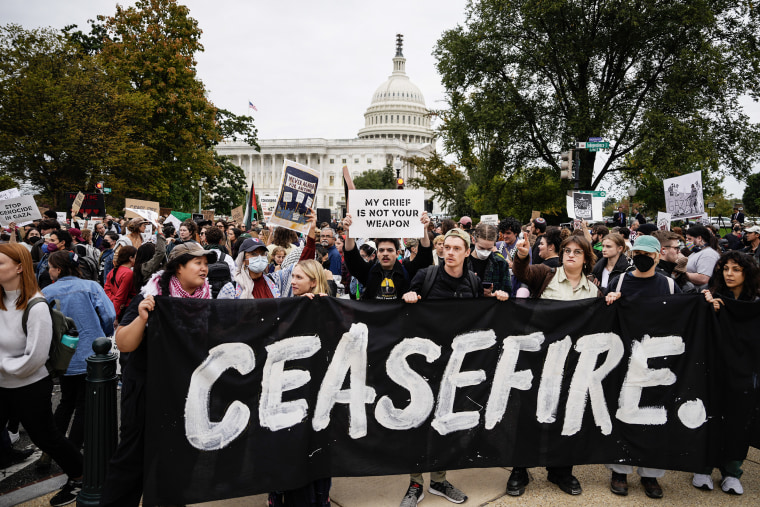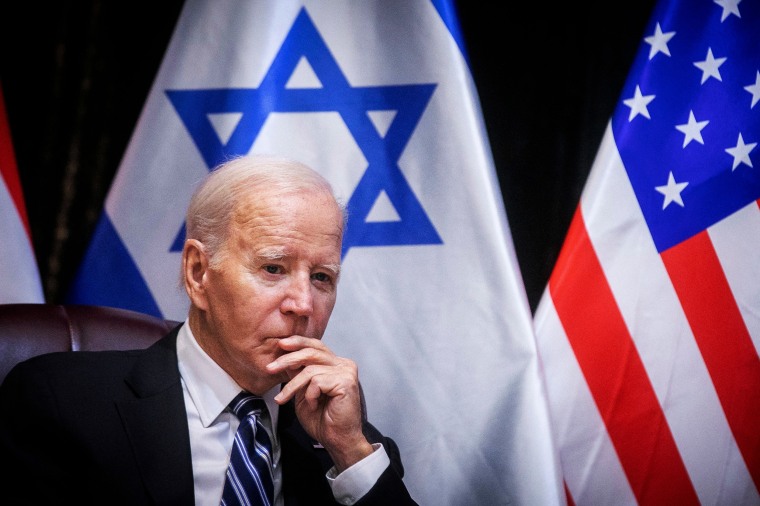WASHINGTON — The Biden administration is facing growing internal dissent over its support for Israel’s military assault on Hamas in Gaza, reflecting a wider debate in American society and a generational divide among Democrats over the issue.
The extraordinary scope of the dissent inside the government, including statements in open letters from government employees, goes beyond anything seen in previous administrations dating back to the 1980s, including during the Iraq War and President Donald Trump’s restrictions on travel from mainly Muslim states, former officials said.
“It’s remarkable and it’s unprecedented,” said Aaron David Miller, a senior fellow at the Carnegie Endowment for International Peace think tank who worked at the State Department from 1978 to 2003. “I’ve never seen anything like it.”
The administration is now having to mediate its own internal version of the Israeli-Palestinian conflict, Miller said.
After the surprise Hamas attack on Oct. 7 that killed about 1,200 Israelis, mostly civilians, Israel launched an air and ground attack on the Palestinian militants in the Gaza Strip. Israel’s heavy bombardment of Gaza has sparked criticism from humanitarian organizations, and President Joe Biden’s backing of the Israeli response has dismayed many officials inside the federal government.
Hundreds of federal government employees have signed an open letter to Biden demanding his administration push for a cease-fire to protect the lives of Palestinian civilians. Dozens of foreign service officers at the State Department have voiced objections to the administration’s handling of the conflict in several official dissent cables, congressional and administration officials say. And at the U.S. Agency for International Development, hundreds of employees signed a letter critical of the administration’s approach.
In Congress, hundreds of staff members have held protests and signed letters demanding a cease-fire and an end to what they see as a U.S. “blank check” for Israel.

Although the misgivings among State Department employees have yet to prompt a mass resignation, there is a sentiment transcending age, race and gender that the Biden administration’s approach to the conflict in Gaza should be more balanced, one current State Department official said.
“Not everyone is demanding a change in policy, but they are advocating for a shift,” the official told NBC News.
There is a feeling that Israel should not be able to act with “impunity,” the official said, and many foreign service officers believe that with the high civilian death toll in Gaza, U.S. aid to Israel should not remain unconditional, the official said.
“We all saw the pictures on the seventh [of October], and I think there was widespread support for Israel’s right to eliminate this threat. But we also saw the pictures that came out after,” the official said.
“Once pictures started coming out of the rubble of 5,000 dead, 10,000 dead … we all know the tools they used to kill them,” said the official, referring to the U.S.-made weapons supplied to Israel.
U.S. diplomats in the Middle East are sending emails back to Washington saying their most levelheaded counterparts in the region are warning them that America’s reputation is being seriously damaged by its approach to the war, according to two State Department officials.
Generation gap
Many but not all of those urging a shift in the administration’s policies are younger employees — including those who work for U.S. intelligence agencies — who harbor more skepticism about Washington’s traditionally staunch support for Israel, sources familiar with the debate said.
“They have a different view of U.S. foreign policy than the older generation,” said one source with knowledge of the dissenters in government. “It’s a progressive view that sees the U.S. as having made terrible mistakes and not always being on the right side of history.”
The war has exposed a stark generation gap among left-of-center Americans. A new NBC News poll shows 70% of Democratic voters ages 18 to 34 disapprove of Biden’s handling of the war.
The administration has also come under mounting pressure from fellow Democrats in Congress who have lobbied the White House to take a more critical line with Israel.

Although some older, more senior officials may share the concerns raised by their fellow employees, they are more reluctant to go public in their criticism, believing that they have an obligation to their government agencies to keep internal debates confidential, some former officials and sources familiar with the discussion said.
With emotions running high over the conflict in the Middle East, the CIA last month sent out an internal email reminding staff to keep their posts on social media strictly apolitical and nonpartisan, NBC News reported previously.
“It was simply a reminder of existing policy,” a U.S. official said.
The move came after a senior CIA officer, the associate deputy director for analysis, posted a pro-Palestinian image on Facebook.
But it remains unclear if the internal criticism across the federal government will cause a major change in the president’s stance, Miller and others said.
“The question is, does it have an impact on the administration’s policy?” Miller said.
At first, Biden rejected calls for a cease-fire. But as the Israeli military pressed its offensive against Hamas and the civilian casualty toll in Gaza has climbed, the Biden administration adjusted its language, urging Israel to do more to safeguard Palestinian civilians in Gaza.
“Much more needs to be done to protect civilians and to make sure that humanitarian assistance reaches them,” Secretary of State Antony Blinken said on Nov. 10. “Far too many Palestinians have been killed, far too many have suffered these past weeks, and we want to do everything possible to prevent harm to them and to maximize the assistance that gets to them.”
Gina Abercrombie-Winstanley, a former career diplomat who is now president of the Middle East Policy Council, a nonprofit that focuses on U.S. interests in the region, said she believes the dissent is “healthy” for the government and that it’s having an effect.
“The people in the State Department represent America. We have seen support for a cease-fire expressed by a range of Americans as well as many people around the world,” she said.
“I believe it has had an impact. The president has clearly evolved in his statements,” she said, adding that the internal dissent was helping inform the administration’s decision-making.

Administration officials say they do not take the deaths of Palestinians lightly and that they have worked around the clock to try to get more humanitarian aid into Gaza. White House officials have also pointed to an ongoing pause in fighting, which was extended on Thursday, as proof that their diplomatic efforts have helped secure the release of dozens of hostages held by Hamas and opened the door to more humanitarian assistance for the beleaguered Palestinian population of Gaza.
‘A policy that has not led to peace’
So far, only one employee at the State Department has resigned over the issue, according to the department.
Josh Paul, the former head of the department’s political-military affairs bureau, resigned in protest in October, saying he could not abide by America giving weapons to Israel without stricter conditions.
“On Oct. 18, I resigned from the State Department because I could not support the provision of U.S. weapons into the conflict in Gaza, where I knew that they would be used to kill thousands of civilians,” Paul wrote in an op-ed in The New York Times. “I saw no willingness to re-evaluate a long-term policy that has not led to peace and has actually undermined both regional stability and Israeli security.”
Since 1970, the State Department has had an official mechanism for diplomats to formally express their disagreement with a policy, known as the “dissent channel.” But that channel is strictly confidential, and foreign service officers are not supposed to share the details of their dissent publicly.
At least three dissent cables have been submitted to State Department leadership, according to two U.S. officials.
The State Department and USAID say they are aware some employees have misgivings about administration policies on the Israel-Hamas war and have written to their workforces encouraging a “candid” exchange.
“We’ve organized forums in Washington to hear from you, and urged managers and teams to have candid discussions at posts around the world precisely so we can hear your feedback and ideas,” Blinken said in an internal letter to employees earlier this month. “I’ve asked our senior leadership to keep doing that. We’re listening: what you share is informing our policy and our messages.”
The American Foreign Service Association, the union for the State Department’s diplomatic corps, said it was “heartened” by how the administration has responded to the internal dissent.
“We know that there has been some concern with current policy, in particular by members of Arab American and Muslim American employee organizations at the State Department and elsewhere,” said the association’s president, Tom Yazdgerdi.
“We know that these employee groups met with Secretary Blinken and other members of leadership at State. That is crucial because dissenting views especially need to be heard and we hope they are taken into consideration,” he said.

